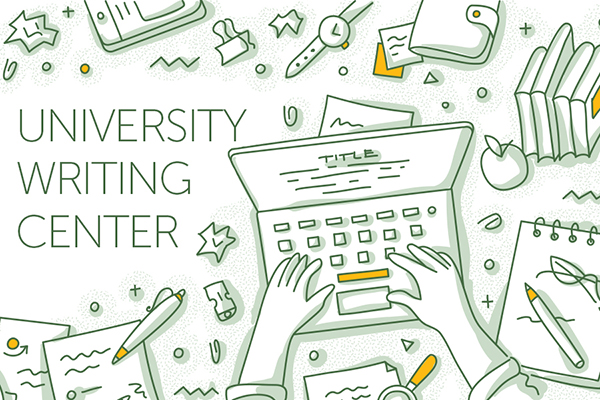The University Writing Center: A Resource for All Disciplines

Associate professor of English, Dr. Kara Poe Alexander, has served as director of the UWC for the past two years. She has spent that time reframing and retooling the program to attract a wider audience and dispel the misperception that services are limited to English coursework. Referring to the UWC as a repository of writing, Alexander stresses that its mission is to help students across all disciplines become better writers.
“One of my goals is to get students… to think of this as not just an English place, but a place for any type of genre, any type of discipline, any type of writing,” Alexander said. “We're trying to equip students with the skills that they can use after the class is over, after they graduate, so that they become a more critical reviewer of their own writing.”
To extend the program’s reach, Alexander has changed UWC hiring practices to include undergraduates from diverse academic disciplines and backgrounds. Since UWC began in the 1980s, first-year English graduate students exclusively staffed the program as tutors in preparation for classroom teaching. Today, UWC employs a more varied group of about 30 students as trained consultants, a relatively new title that conveys how the UWC seeks to engage with those it serves.
“We ask a lot of questions and get them thinking about things that maybe they haven't thought about in terms of subject matter or in terms of writing because a lot of them come in confused,” Alexander said. “Our goal is to help students become better writers, not just improve a paper.”
Alexander encourages professors to refer students to the UWC, where they can schedule up to two hour-long appointments per week. The Moody Library space comfortably accommodates in-person sessions, while online video consultations provide an alternative option for students to access the help they need. Additionally, asynchronous appointments allow grad students to email their drafts for feedback to facilitate the revision process.
“I would love for professors to see us as a place for supplemental writing instruction,” Alexander said. “We can do individually for students what professors cannot do, because they have 30 students in one class, while we can offer that one-on-one teaching.”
Ideally, students should visit the UWC early in the writing process, when they’re brainstorming about their assignment. Consultants help them develop their ideas, strengthen the rhetorical style and organization of their content and hone their proofreading and editing skills. Through drafts and revisions, students learn to shape and effectively communicate their point of view. Alexander notes that the approach is modified for non-native English speakers, who represent about 20% of UWC’s clients, to focus more on grammar.
“We see ourselves as a teaching unit where we really take what students are working on, and take their instructors’ assignments and help them understand them,” Alexander said. “We don't write on their paper; it’s more of a conversation that we have with students.”
Following each session, consultants create a client report that summarizes for the professor what was covered with their student, how the student engaged in the process and a brief description of what the next session will encompass. Alexander says professors appreciate the input about their students’ challenges and progress regarding their assignments.
The UWC’s services are free to students, faculty and staff for a variety of writing projects, including but not limited to academic, technical, scientific, multimodal and digital writing, along with job application materials and theses.
For more information or to schedule an appointment, visit www.baylor.edu/UWC.